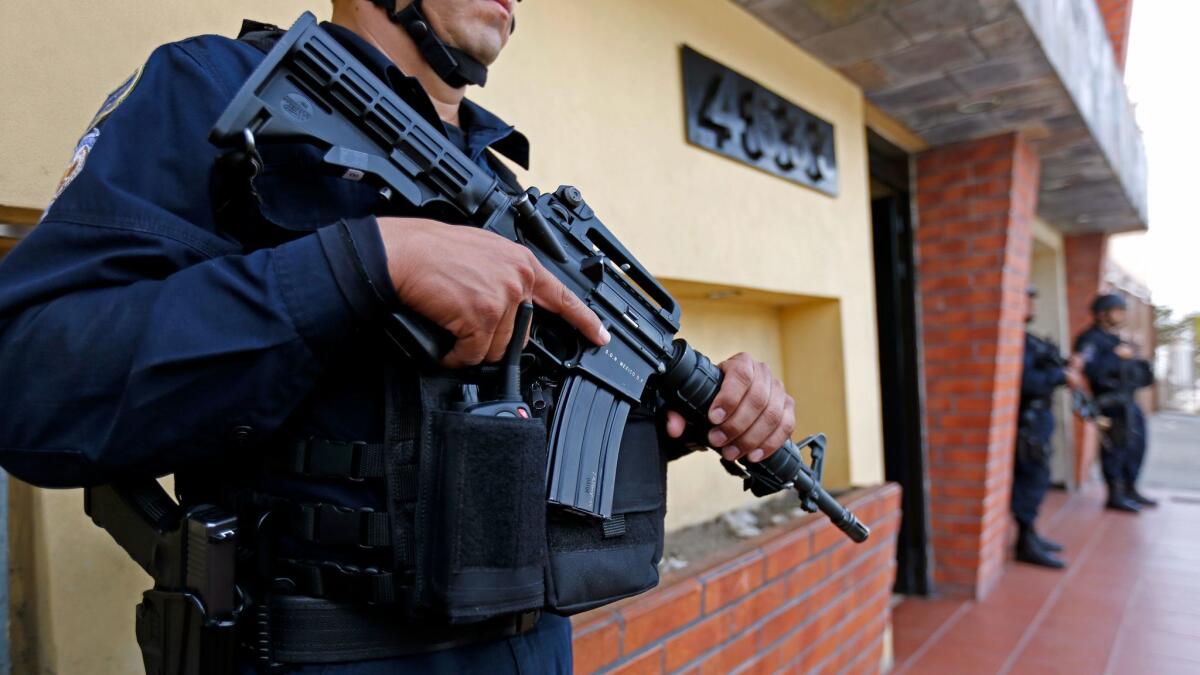Two high-profile killings in Mexico stoke outrage about nationwide surge in slayings

- Share via
Reporting from Mexico City — Public indignation about Mexico’s surging homicide rate has followed the two latest high-profile killings — those of a human rights ombudsman in Baja California Sur state and a telecommunications executive outside Mexico City.
President Enrique Peña Nieto denounced the killing of Adolfo Lagos Espinosa, a vice president of the Televisa media giant, who was shot Sunday in an apparent botched robbery as he was bicycling in a rural area close to the landmark pyramids of Teotihuacan, northeast of Mexico City. A gunfight broke out between two assailants and two of the executive’s bodyguards, police said.
“I lament and condemn” the killing of the executive, the president wrote on Twitter.
Then late Monday, at the end of a long holiday weekend, came news of another slaying, that of Silvestre de la Toba Camacho, president of the human rights commission in Baja California Sur, a popular international tourist destination that has been rocked by gang violence.
Nationwide, 2017 is on track to be the deadliest year in recent Mexican history.
From January to October, authorities say, Mexico registered 20,875 homicides — almost 4,000 more than the 16,881 homicides reported during the same 10 months last year.
Condemnations of the two recent killings were widespread in news columns and on social media. Many commentators blamed the government for not doing more to improve security.
Authorities said De la Toba, unlike the media executive, was assassinated.
Assailants in the state capital of La Paz opened fire Monday on a vehicle carrying De la Toba, 47, and his family, authorities said. Also killed was his 20-year-old son, Fernando. His wife and daughter were seriously injured, police said.
The killing of De la Toba was believed to be the first assassination of a human rights ombudsman since the post was created more than a quarter-century ago in a bid to improve safeguards for Mexican citizens.
The federal Interior Ministry called on he state of Baja California Sur officials “to find those responsible and bring them to justice.”
De la Toba, a former state lawmaker, was appointed to the human rights post in 2015.
His death was the latest killing in what authorities have called an epidemic of violence in Baja California Sur, where various gangs are reported to be battling for control of the lucrative drug-trafficking corridor.
At least seven other homicides were reported Monday in Baja California Sur, where 409 people have been reported killed from January to October — almost tripling the 147 killings reported during 2016, officials say.
Experts cite various reasons for the rise in killings, including the chaos that has ensued as rivals battle for the turf formerly controlled by fallen drug cartel leaders such as Joaquin “El Chapo” Guzman. Several factions are said to be engaged in bloody competition for the fractured empire of the former head of the Sinaloa cartel, now jailed in New York on various charges.
The jump in violence has been a significant blow for the image of Peña Nieto and the ruling Institutional Revolutionary Party. The president’s approval ratings have skirted record lows as he nears the end of his six-year term next year. Analysts say outrage about the violence could damage the party’s chances to retain power in the presidential contest scheduled for July.
Although the slayings of the television executive and the human rights ombudsman have garnered headlines, most killings here involve victims who are largely anonymous. The daily rash of homicides seldom yields the kind of public attention and vows to find those responsible that accompany the slayings of high-profile figures.
Writing in La Jornada newspaper, columnist Julio Hernandez Lopez contrasted the broad denunciation of the “deplorable crime” of the Televisa vice president’s killing with the government’s “systematic and overwhelming indolence” about everyday crimes inflicted against average people. A common complaint here is that police seldom conclude in-depth investigations of many crimes, including killings, muggings and organized attacks on buses carrying commuters.
“Every day there are dozens of complaints from citizens who don’t deserve bureaucratic maltreatment just because they don’t have big jobs in business,” the columnist wrote.
In many cases, citizens who are victims of crime are taking matters into their own hands. Authorities have reported a rise in vigilante justice as violent crime has soared.
Last week in Oaxaca state, authorities said, residents of a rural town outside the capital captured three assailants who were robbing a home. The townsfolk beat and then burned the attackers, authorities said. All three died from their wounds, officials said. Police in Oaxaca are still investigating the case.
-- Cecilia Sanchez in The Times’ Mexico City bureau contributed.
Twitter: @PmcdonnellLAT
ALSO
He defended the sacred lands of Mexico’s Tarahumara people. Then a gunman cut him down
‘Mexico is one big cemetery’: The search for the secret graves of ‘the disappeared’
This Mexican village lives under a volcano — but it’s earthquakes residents fear
More to Read
Sign up for Essential California
The most important California stories and recommendations in your inbox every morning.
You may occasionally receive promotional content from the Los Angeles Times.













